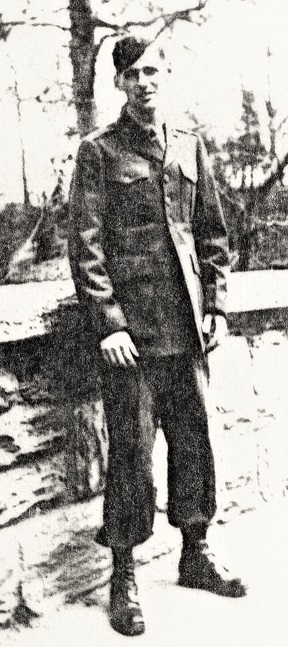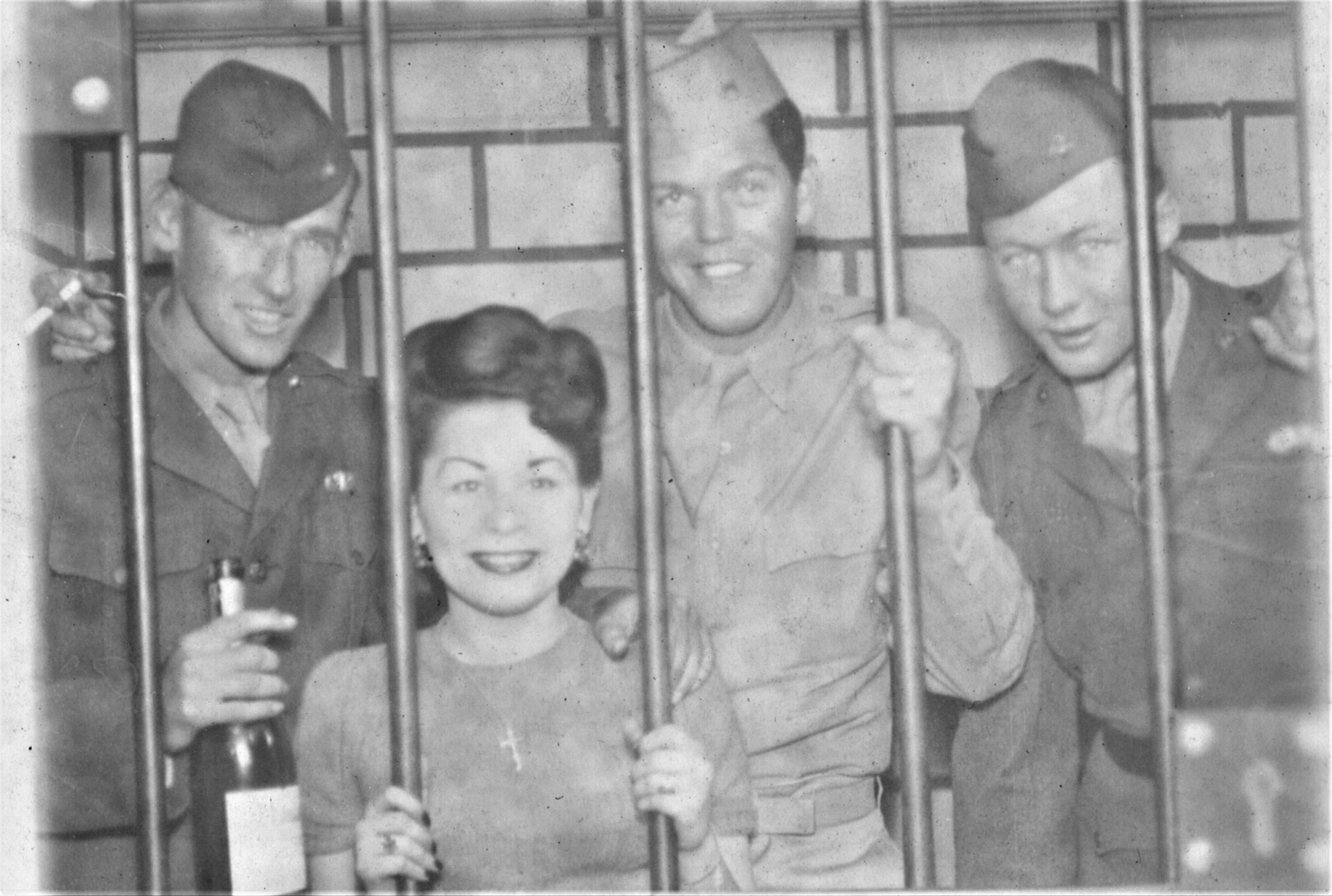Francis P. Conlin, Jr., New River, NC, August 1942.
UPDATE: May 27, 2019
I’ve kept searching to pull Cpl. Frank Conlin a little further out of obscurity…with some surprising results: contrary to the report in the Evening Bulletin, Frank was wounded on February 27, his 9th day into the battle for Iwo Jima and 12 days before he died. According to records in the National Archive, Frank died of “wound, fragment, shell, rt. side.” The record also notes that he was buried in a military cemetery on Guam. I haven’t yet found if he was transported to Guam for treatment before he died—air evacuations of wounded began on March 6, 1945—or simply for burial. I also found that his name is etched on his parents’ gravestone in West Conshohocken, PA…so I continue searching for records to confirm that his body was repatriated during the government program to return the war-dead during 1947-48. Below is the original blog.
He was killed in obscurity on this day, March 10, 1945, Francis Patrick Conlin Jr. I struggled to find details of his death during the battle of Iwo Jima. I can find no record of when he went ashore or how long he battled before he was killed. Two internet records note simply that he was “killed in action” and “died of wounds,” but I don’t know how he was wounded or how he may have suffered before he died. His parents would have received his Purple Heart explaining the circumstances of his death…but I can find no record of it. I assume that he was buried on the island, but I don’t know if he is still there or was later moved home (as many others were) to a local grave. Obscurity.
Home on leave in Philadelphia, PA, March 1943 (L to R): Jack Pawley, Frank Conlin, Mary Pawley and her future husband, Jerry McCauley.
I’m haunted by the obscurity of this young man, Frankie, who was so close a friend to my uncle (Bill) and father (Jack), so highly regarded by my grandfather and aunt (Mary), that he could have been the third Pawley brother. The family letters collected in A Philadelphia Family Goes to War overflow with mentions of Frankie, questions about his whereabouts and well-being: he is mentioned over 100 times in their correspondence, beginning in Letter 1, up to Letter 299 when Mary reports that he was killed on Iwo Jima, and finally in Letter 392 after the war is over, when my uncle confesses he’ll miss Frank more when everyone is back home again. But who was this young man who gave his life?
Months ago I set out to write a blog about the word “Obscurity,” except that my work on the letters redirected me: I felt as if the dead were communicating with me about their long-lost lives. Yet the idea of obscurity persists…lives begun and sacrificed in honor during the war, lives lost in obscurity by number (so many of them: 6,825 Americans died on Iwo Jima) and time (so long ago: 74 years).
I’ve worked since to pull Frankie out of obscurity, but to only small effect:
His memory is clouded from the very beginning when The Evening Bulletin originally reported his death misspelled as Francis Conlan, Jr….and so I question the accuracy of their other information.
Frank Conlin in his paramarine fatigues and jump boots, March 1943.
He attended John Bartram High School and left his job at Sharp and Dohme to enlist, June 1942 at age 20. He trained as a Marine paratrooper in New River, NC and then at Camp Pendleton in San Diego, CA until the “paramarines” were disbanded in January 1944…the letters explain that Frank was very disappointed and maddened by this. He was transferred to the Fleet Marine Force and shipped out to the Pacific Theater in August 1944.
Internet information reveals that he had an older sister (Elizabeth), a younger sister (Anna), and a younger brother (John).
The letters reveal that Elizabeth had a baby some months before Christmas 1944, so Frank probably knew that he was an uncle.
On leave and living it up in Los Angeles, CA, August 1944 (L to R): Frank Conlin, an anonymous friend, Bill Pawley, and Mike Kelly.
Bill prophetically writes in his letter of 08/20/1944: “Enjoyed seeing Frankie but doubt if we will be able to get together again.”
Mary’s letter of 03/28/45 reveals that the Conlins received a letter from Frank on March 12th saying he’d been wounded and was in the field hospital; then they received the infamous “telegram” on March 16th reporting his death…ironically he had died on March 10th.
Mary’s letter of 08/14/45 reveals that Mr. Conlin believed “Frank had [his] whole heart wrapped up in the Marines.”
Frank Conlin dreaming of future days, with Mary Costello, March 1943.
Two of Frank’s letters to Jack were saved among the collection and reveal a bit of his personality.
He uses the language of a 1940s hipster: Jack’s girlfriend is “quite the chick,” and Frank’s girlfriend, Dot, is “au reet.” He refers to Jack and the other sea-going Marines as “you cats.”
He writes with humor and exaggeration as he complains about Marine life: “My feelings for the F.M.F. are not permitted to be put in a letter…you would probably lose sleep at night.”
In the two months before he is killed, he hopefully writes of times to come: “I received a picture from Dot…I’ll be married before I get home if things keep up.”
Then he writes of joining the police force: “…all I want [is] to get on the force so I won’t have to walk the kid at night.”
Finally, he writes of just being home again: “Boy, just think of all the nights we can spend drinking and talking about this Great Marine Corps—ah, yes, what an outfit.”
Bill writes to Jack in April 1945, “it is pretty hard to believe such a happy-go-lucky guy like him could be dead on some damn little island that God forgot.” It is that kind of obscurity for so many young lives cut short that haunts me.





